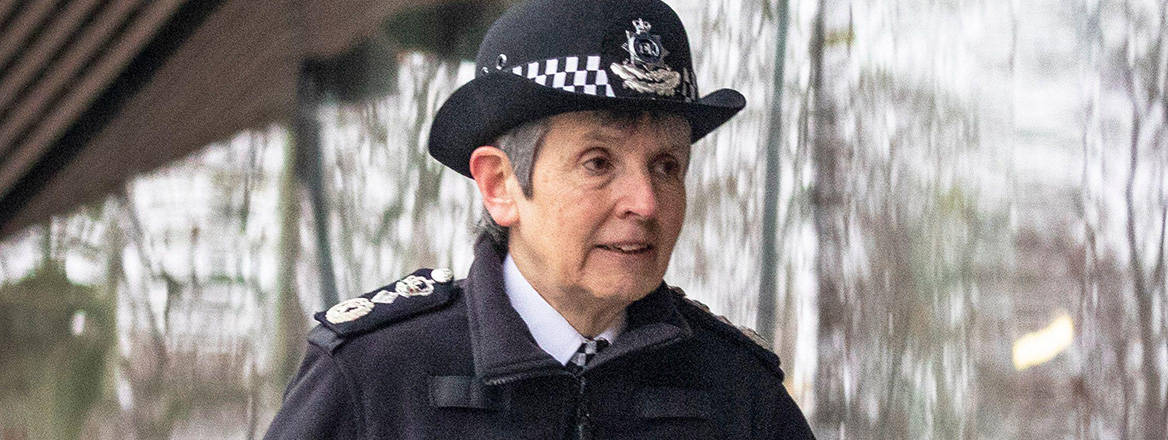Public Confidence in the Police: A New Low for the Service
Following the decision by Cressida Dick to step down as Commissioner of the Metropolitan Police Service (MPS), whoever takes over needs to quickly rebuild public confidence in the police.
Her resignation could not have come at a more critical time. In March the Police Foundation will launch its final report of the Strategic Review of Policing in England and Wales. We are told the report will set out a long-term strategic vision for the police service, as well as make recommendations for addressing the public safety challenges of the 21st century. Its release is long overdue, as a spate of recent shock revelations have shaken confidence in the police service.
The policing model in the UK relies on the public’s consent and trust. This trust is not only based on the police’s efficacy and competence in tackling different crimes and maintaining order, but also on how the public perceive that they are treated by the police. In recent months, trust in the police has been severely affected by events such as the kidnap, rape and murder of Sarah Everard by police officer Wayne Couzens, and the Stephen Port case, where police failings contributed to the deaths of some of the victims. The impact of the Black Lives Matter movement internationally has shaken confidence in the police across many countries and has resonated in the UK. According to the 2020 Crime Survey of England and Wales, public confidence in the police has been on a downward trend over the last two years – from 62% in 2017 to 55% in 2020.
Police performance in tackling violence against women and girls (VAWG) has also contributed to the decline in the public’s trust in the service. While it should be acknowledged that due to the crime’s nature it is often difficult to gather substantial proof to prosecute and secure a conviction, the police have often been criticised for a lack of care and sensitivity towards victims, possibly explained in part by a lack of training in the matter. While reporting of VAWG has increased, the proportion of charged and prosecuted cases has fallen steadily since 2015/2016, with the number of rape cases charged falling from 57% to 45% and the number of sexual assault cases prosecuted declining from 40% to 36%, according to a 2021 government report on tackling VAWG. This is reflective of the overall police response to crimes of a sexual nature, specifically those relating to women and girls. In the Sarah Everard murder case, while the public struggled to comprehend how a police officer could commit such a crime, the media portrayal of the police’s handling of the vigil further tarnished an already bruised reputation. The investigations that followed revealed a system where corruption is deeply rooted, and where institutional misogyny and a toxic work culture affect victims and officers alike. All women should feel safe to walk home at night and to call on the service of the police to protect them if needed, not to fear that by so doing they could put themselves in mortal danger.
In a similar vein, an inquiry into the extent to which institutional homophobia within the police service might have had an impact on the investigation of the Stephen Port case found that the police’s judgement may have delayed the identification of Port as the perpetrator in some of the cases, resulting in the deaths of more victims. Over the course of 16 months, Port killed four young men by overdosing them on GHB. The bodies were found near Port’s flat in Barking. However, despite the many contradictions in Port’s statements and the obvious similarities in the cases, police officers failed to quickly connect the murders, coordinate between forces and take an adequate course of action which could have prevented further deaths.
Investigations following the Sarah Everard case revealed a system where corruption is deeply rooted, and where institutional misogyny and a toxic work culture affect victims and officers alike
In 2013, the start of the Black Lives Matter movement in the US already highlighted issues within the UK police. This was further intensified after the murder of George Floyd by a police officer in Minneapolis in 2020. While police officers in the UK are not armed, there has been severe criticism of the disproportionate treatment that ethnic minority groups receive from the police. For instance, black people are seven times more likely to be stopped and searched. Officers from ethnic minorities only constituted 7.5% of the force in December 2020, and were even less represented within senior positions. The police force has taken measures to tackle these issues, however, it is argued that improvements are not being made fast enough.
It is perhaps unsurprising therefore that confidence in the police has been on a slight downward trend, particularly among ethnic minority groups. In the year 2019/2020, 74% of all respondents to a survey reported having confidence in the police. This was a slight decrease from the 78% reported between 2015 and 2018. Additionally, when compared to other ethnic minority groups, black people were found to be more likely to report lower levels of confidence in the police.
While such events paint a worrying, if not gloomy, picture, in some areas it is evident that the police are doing comparatively well. For instance, Cressida Dick’s own force, the MPS, perhaps the service most affected by some of the recent bad news, has a good brand name in Scotland Yard and a reputation that is known and revered globally due to how it historically shaped policing techniques, as well as its work against terrorist threats in recent years. Its work with the Mayor's Office for Policing And Crime and the Trident Team to divert young people from offending or reoffending has been lauded, with projects such as ‘London Gang Exit’ and ‘Divert’, resulting in a reoffending rate of only 8%. The MPS has been praised for how it has responded to county lines drug distribution and modern slavery, for how it has responded positively to new threats such as cryptocurrency-related crimes, and for the achievements of Viper, its dedicated firearms threat desk dealing with firearms intelligence and incidents to identify and respond to emerging threats. It is making positive progress, too, in relation to domestic abuse, with an arrest rate of 34.6%, above the 31.8% national average according to the most recent PEEL Assessment for 2018/2019. The performance of the UK police is consistently good when it comes to homicide conviction and detection rates. For instance, in the year 2020, there were 681 suspects charged relating to 703 homicides, and for the period from March 2018 to March 2020, 79% of those indicted for homicide were found guilty, with the rest being acquitted or charged with a lesser offence.
During the pandemic, the police have played an essential role in applying the COVID rules. While restrictions often changed from one day to the next, the police proved themselves to be adaptable and reasonable, with only a few highly mediatised cases of the police abusing their power. Their overall response throughout the pandemic has been praised, especially their 4 E approach (Engage, Explain, Encourage and Enforce as a last resort), which has helped ensure good relations with the public.
Many of the issues facing the MPS have been around since long before Cressida Dick took over the reins, but she has been accused of not doing enough to tackle them
It seems that the police may be excelling in some areas while neglecting others. This has been highlighted in a 2021 briefing paper. It appears that a focus on terrorism and serious and organised crime leaves the police with limited time and resources to deal with crimes and issues of importance to the public. It is evident that public expectations outstrip available resources, as found by Her Majesty's Inspectorate of Constabulary and Fire and Rescue Services (HMICFRS) in their 2019 report. Even the recruitment of 20,000 officers by March 2023 will do little to resolve the gap between demand and resources. These officers also need to be properly vetted and trained, and that takes time.
Many of the issues facing the MPS have been around since long before Cressida Dick took over the reins, but she has been accused of not doing enough to tackle them. For example, after the murder of Sarah Everard, there has been pressure to reform the system, to put an end to the misogynistic culture and to establish a more proactive approach when denouncing inappropriate behaviour within the workforce. The case also showed that the vetting process had been ineffective, as it was admitted that vetting errors had been made during the hiring process of Couzens, the man responsible for Everard’s death. Given this finding, it is concerning that while all existing officers should have been re-vetted as outlined in the 2006 guidelines issued by HMICFRS, only a quarter have been as of this year.
The actions of a minority of bad police officers disproportionately affect the wider public perception of the police force and can deeply rupture the trust the public place in them. We cannot second guess what will be in the Police Foundation’s report, but it is important now, more than ever, that whoever takes over from Cressida Dick ensures that the lessons are learnt, that processes which should be in place such as re-vetting are expeditiously conducted, and that the focus of the police’s efforts is firmly fixed on building back public confidence. Focusing on their media image has been proven to have little effect on public confidence. Instead, the police need to direct their efforts towards improving the quality of their everyday encounters with members of the public. Reducing the number of negative encounters will be more effective in maintaining and building public confidence.
The views expressed in this Commentary are the author’s, and do not represent those of RUSI or any other institution.
Have an idea for a Commentary you’d like to write for us? Send a short pitch to commentaries@rusi.org and we’ll get back to you if it fits into our research interests. Full guidelines for contributors can be found here.
WRITTEN BY
Katerina Duran Mynenko
Dr Keith Ditcham
External Author | Former RUSI Senior Research Fellow


